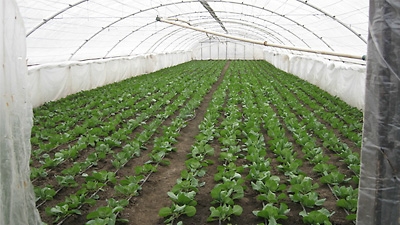![]()
WASHINGTON, April 4, 2013 — A new World Bank book on the impacts of climate change on agriculture in the Europe and Central Asia region indicates that projected changes in temperature and precipitation in Uzbekistan are expected to increase the vulnerability of the country’s agriculture sector and rural populations if no action is taken.
The book, Looking Beyond the Horizon: How Climate Change Impacts and Adaptation Responses Will Reshape Agriculture in Eastern Europe and Central Asia, offers new insights and adaptation options for the agricultural sector in Albania, the Former Yugoslav Republic (FYR) of Macedonia, Moldova, and Uzbekistan.
According to the book, temperatures in Uzbekistan are expected to increase by 2 to 3o Celsius over the next 50 years – well above the increase of about 1.5o C observed in the country over the last 50 years. Additionally, incidents of extreme heat have been reported by farmers, while average annual rainfall is forecast to fall by about 10 mm in the highlands and increase by 40 to 50 mm in the desert areas of the country.
Building on these projections, this book offers impact assessments of climate change on agriculture for the country. If no adaptation measures are taken beyond changing planting dates in response to climate change, and taking reduced water availability into account, nearly all crop yields could fall 20 to 50 percent by 2050. Yields of wheat and cotton, key commodity crops for Uzbekistan, will decline along with decreased yield of apples, potatoes and tomatoes. Grassland and alfalfa yields, however, are expected to show better yields.
Since nearly all crops are irrigated in Uzbekistan, and with an expected increase in water demand from municipal and industrial sectors through economic expansion, it will be important to manage water resources, as with the other countries mentioned in the book.
“Farmers are already confronting the impacts of climate change, and their livelihoods depend on their ability to match their own efforts to respond to these effects with help from their governments and the private sector,” said William Sutton, an author of the book and a Lead Agriculture Economist at the World Bank. “What this research offers is an approach for examining the potential impacts of climate change on agriculture, and for devising a range of options to help all parties play meaningful roles in adapting to the impacts, and making the most of the opportunities.”
Key recommendations at the national level include:
- Improve the education system for farmers and access to it, with a focus on growing drought- and pest-resistant crop varieties; and
- Encourage private sector involvement in adaptation
Key recommendations at the Agro-Ecological Zone (AEZ) level:
- Improve crop varieties;
- Improve irrigation infrastructure and drainage systems; and
- Optimize agronomic practices such as fertilizer application and soil moisture conservation.
Uzbekistan is teaming up with the Global Environmental Facility (GEF) to pilot some recommendations and is addressing some other options raised in the report in a new agriculture competitiveness project, as well as a series of irrigation projects.
“This is about adaption to climate change to minimize the more damaging effects,” said Jitendra Srivastava, co-author of the book and agriculture specialist consultant to the World Bank. “Given the resources and information, farmers can take advantage of longer growing cycles, and plant more resilient crops so they can be confident they can still earn a living.”
“We believe it is urgent and central to understand the scope of climate change, its impacts on agriculture, and the possible responses in this region. This study aims to address these concerns by building awareness about climate change in our client countries and to work with them to offer practical climate smart solutions,” said Dina Umali-Deininger, Agriculture and Rural Development Sector Manager in the World Bank’s Europe and Central Asia Region.
This book is part of the broader climate smart agriculture approach being implemented by the World Bank. This approach emphasizes the need for agricultural practices that can simultaneously increase productivity in today’s climate, build resilience to climate change, and reduce greenhouse gas emissions – contributing to a “triple win” in the agriculture sector and providing sustainable solutions to the challenges posed by a shifting global climate.

